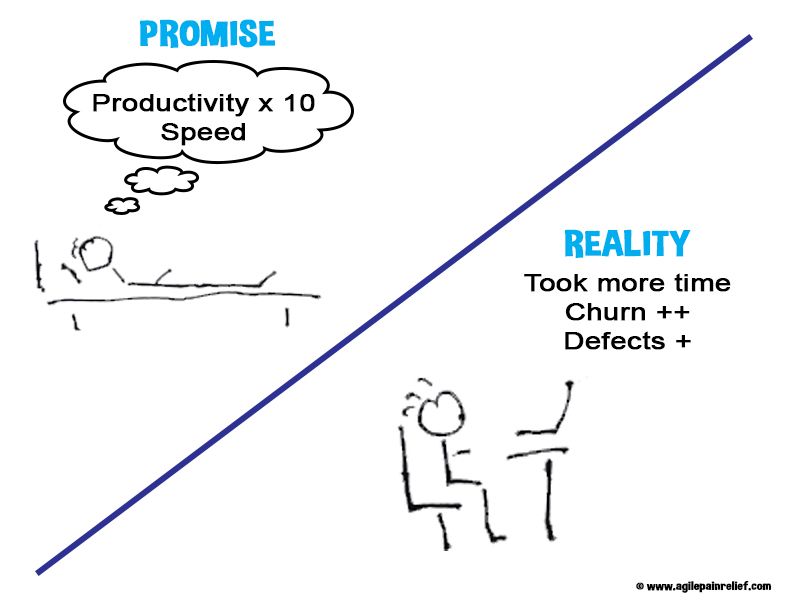Agile Tools for Job Search - An Evolving Post
In recent months I have seen hundreds of people on LinkedIn and other places, who have been laid off. I see many people encouraged by well-intentioned, helpful outplacement services to tweak their resumes to get ingested by a ranking tool. If you’re lucky this might result in an interview and in some rare cases a job. If this worked for you and a job that brings you joy, then stop reading this entry isn’t targeted at you.
Applying for a job the traditional way has rarely worked well. It’s getting worse now for a few reasons: more competition (yes); but much worse Applicant Tracking Systems are forcing everyone to turn their resumes into clones. The problem is much like Google search, everyone’s webpage has very similar content because we’ve all learned what ranks well.
I’ve talked to more than a few people who’ve succeeded in their job search. Some things that have stood out: they had a vision; they had an iterative and incremental process and they remembered their sense of self-worth doesn’t come from a job. Many also discovered their next job through their network and not the application process.
When I’m advising an organization, I tell them that your Product or Team needs a good vision to be successful. By the same token, as an individual, you need a good vision about what you want from your next job. Without a clear vision, we have a hard time evaluating whether the next opportunity in front of us is a good opportunity for us.
Being unemployed, or having that threat looming, is an emotional time so having a clear vision of what you want will help you avoid making impulsive decisions. “I want to find a job as a ScrumMaster.” Okay, great, but do you have a clear picture of what it is about that role that you want? If not, how will you know whether you’ve found a good fit?
Getting hired into a position that is a poor fit is a bad idea, but I do appreciate that, for some people, cash may be tight enough that choice is affected. Having a clear vision, even when circumstances temporarily limit options, is still invaluable. Maybe even more so.
I’ve read a heap of books that helped me on the journey of defining my vision, and these are the best three that I recommend:
- Hero on a Mission: A Path to a Meaningful Life by Donald Miller
- Be Your Future Self Now: The Science of Intentional Transformation by Dr. Benjamin Hardy. This book should be about 1/3 of the length that it is, and it’s not a long book.
- The 12 Week Year: Get More Done in 12 Weeks than Others Do in 12 by Brian P. Moran, Michael Lennington
Taking the time to establish a clear vision is just as important in life as it is in product development. Otherwise, you’re plugging away, without knowing if you’re putting time and effort into the things that actually matter to you.
I have a Life Vision and 3 Year Vision (akin to the 12 Week Year approach). Very generally speaking, my long-term Life Vision is to help 100,000 people create teams that are fun to work in and get great work done. Also to have the freedom to travel and contribute financially to social and charitable causes that are important to me. My mid-term 3 Year Vision is to create new products that successfully support ScrumMasters and Product Owners, as well as a dynamic and engaged online community.
I share those in very general terms with you, but my actual visions are much more detailed. They include the emotions I will feel when I reach those goals, and the steps to do so. This level of detail is important because you need to know what you want, and how you want to feel when you get it, otherwise even if you achieve it, odds are that you won’t be happy and enjoy it.
Approach it in a Scrum way, visualize your strategy (hint Story Map); determine what the next most important steps are; break the work down into small manageable chunks; and prioritize. Perhaps most important don’t be afraid to make mistakes.
Do frequent planning, refinement, review, and retrospective. Assuming you know Scrum. all those things are familiar. For example, every quarter I schedule time to take 1–2 days to review my efforts in the last quarter, and find 2–3 areas I would like to improve and then plan the next quarter. Every week on Sunday evening I review the past week’s accomplishments, recheck the quarterly plan, and then I plan the next week. (Yes, this is a Sprint Review, Sprint Retrospective and Sprint Planning all rolled into a single event, don’t do this with your actual team.)
Of course, you can’t control outcome, any more than you can control whether customers buy and use a product. But what you can control is the effort you put into it. So when I measure my success in a week, I ask myself whether I achieved what I set out to achieve. If you’re a job seeker, you might ask yourself if you made X meaningful posts on LinkedIn, or built one new relationship with someone who could help you. Only you can determine how and what to measure because only you know what you’re aiming for. Just remember: small, incremental steps.
Caveat: Clearly, I’m not an expert in job searching - I’ve only ever had three jobs and for the past 15 years I’ve run my own business. My skill is in helping people understand new ideas or old things from a new viewpoint.
I’m aware many of the people looking for work would value getting CSM or CSPO. Use the code UNEMPLOYED-2026 for our CSM or CSPO training.
Unfortunately, our registration tool doesn’t allow to me share a link with the discount baked in. (We asked and they don’t think the feature is a priority. Fair enough, I ask product owners in our workshops to give a clear no, I can’t complain when I get one).
To register and receive the special offer pricing, please: – Go to the course registration page for the preferred dates: Certified ScrumMaster training or Certified Scrum Product Owner training – Select “Regular” ticket (this is important as it won’t work/be valid otherwise) – Apply this code during checkout to receive the special discounted rate: UNEMPLOYED-2026
Caveats:
- If you’ve not worked in technology before, neither certification will be enough on its own to help you get into the technology world.
- Many organizations are looking for people with a blend of skills, i.e. a ScrumMaster who can also work as a team member. Being multi-skilled is a win.
- If you’re employed, please pay the regular price so I can subsidize those who need help.
Other sources
- Book: Never Search Alone: The Job Seeker’s Playbook and its accompanying support website – the author advises creating a Job Search Council. Very much in line with my thinking.
- Accountability group for former attendees - If you’ve attended a workshop with me ever, I’m setting up a mutual accountability group inside our 3 Percent Better Community.
- My approach bears some similarities to Personal Agility and Personal Agility: Unlocking Purpose, Alignment, and Transformation
- Bernie Maloney has a video series on networking, resumes and interviews
- Mark Kilby - Are You Job Hunting or Job Fishing
- Johanna Rothman - has written a book, Manage Your Job Search, and has additional blog material
- Elisabeth Hendrickson - Your Next Manager
- Alberto Blanco - Career Transition Retro for Agile Coaches
Interviewing.io had a paper on recruiting and it also gave advice on the job search: “We strongly encourage anyone looking for work in this market, especially if you come from a non-traditional background, to stop spending energy on applying online, full stop. Instead, reach out to hiring managers. The numbers will be on your side there, as relatively few candidates are targeting hiring managers directly.”
Beware, there are people charging job seekers money for help. Bernie Maloney warns of hiring bandits - _gross (_the bandits, not Bernie 🙂)
If you’re a vendor and email me regarding this post, I will just mark your email as spam. (I already get 2–3 emails a day looking to promote things on our site.)
This is a moving target. As I find more things that have helped others, I will update the blog post.

Mark Levison
Mark Levison has been helping Scrum teams and organizations with Agile, Scrum and Kanban style approaches since 2001. From certified scrum master training to custom Agile courses, he has helped well over 8,000 individuals, earning him respect and top rated reviews as one of the pioneers within the industry, as well as a raft of certifications from the ScrumAlliance. Mark has been a speaker at various Agile Conferences for more than 20 years, and is a published Scrum author with eBooks as well as articles on InfoQ.com, ScrumAlliance.org and AgileAlliance.org.
